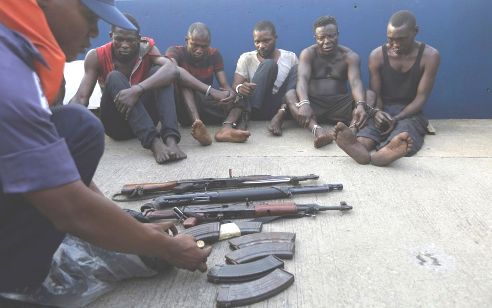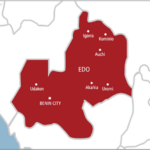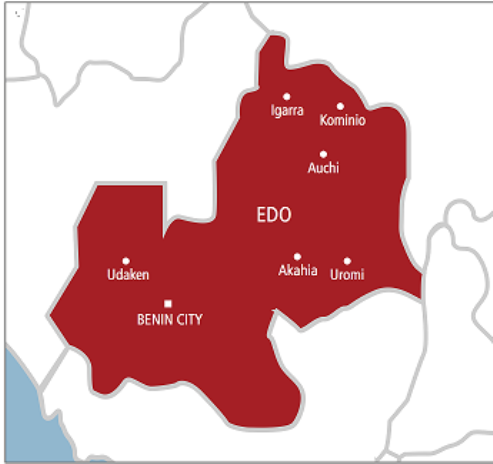
Arrested pirates that hijacked the Panama-flagged Maximus vessel are shown to the media in Lagos, Nigeria – Sunday Alamba /AP
LAGOS FEBRUARY 21ST (NEWSRANGERS)-Global shipping leaders are calling for a beefed-up naval presence off west Africa, amid warnings that the region is facing a Somali-style piracy crisis.
Vessels passing through the Gulf of Guinea, a vast stretch of water from Senegal to Angola, are suffering increasingly violent attacks by gangs who operate with near “impunity” in its poorly-policed waters.
Where once the gangs concentrated mainly on simply robbing ships close to shore, some are now ranging out hundreds of miles to sea and taking entire crews hostage for weeks at a time, forcing shipping firms to pay up hefty ransoms.
The tactic has echoes of the Somali piracy crisis of a decade ago, when more than 150 ships were taken hostage and estimated $500m paid out in ransoms.
“The emphasis is now on the kidnapping of multiple crew members, with the attacks taking place much further out to sea and against all types of shipping,” said Michael Howlett, director of the International Maritime Bureau, the London-based global piracy watchdog.
“The risk-reward ratio is very heavily in the favour of the pirates, and it has become a lucrative business model that must be broken.
“It is a huge sea area to police, and right now, if vessels call for help, there isn’t really a timely and effective response. The pirates are operating with near-impunity and this is an unacceptable situation for innocent crew to be subjected to.”
Mr Howlett was speaking in the wake of the hijacking of 15 Turkish sailors on board the Mozart, a container ship hijacked on January 23 some 200 miles off the coast of Nigeria.
The pirates clambered over rolls of barbed-wire designed to protect the ship and then used an angle grinder to cut their way through the steel door of safe room where the crew were hiding. As they entered the room, they opened fire, killing one sailor and injuring three others.
“They worked to break the doors for six to seven hours,” said the Mozart’s chief engineer Suha Tatligul. “They opened fire as soon as they broke inside.”
The fact that the pirates could spend so long just breaking in shows they had little worry about being caught, security experts say.
The hijacking was one of 16 attacks or attempted attacks this year alone in the Gulf of Guinea, according to Dryad Global, a British maritime security consultancy. Last year, 130 sailors were kidnapped in the region, a figure that accounted for 95 per cent of global kidnappings at sea.
Although the pirates operate all over the Gulf of Guinea, most are criminal gangs based in Nigeria’s Delta region, long a haunt of militant groups fighting for a greater share of the Delta’s oil wealth. Some used to make money from illegal oil tapping and theft of oil from ships, but the collapse in world oil prices since 2014 has forced them to look for more profitable crimes.
The gangs run makeshift “hostage camps” on islets in the Delta region’s dense forests, many of which are accessible only by boat and hard to navigate for outsiders. “It really is the perfect place to be a pirate, much better than Somalia,” said Munro Anderson, a partner at Dryad.
Last month, the Danish shipping giant Maersk called for tougher action after two attempted piracy attacks on the firms’ ships since December. The company also owns the Maersk Alabama, whose hijacking by Somali pirates in 2009 was dramatised in the film Captain Phillips, starring Tom Hanks.
“The risk has reached a level where effective military capacity needs to be deployed,” said Aslak Ross, Maersk’s head of marine standards.
The problem is partly because governments in the region – one of the world’s poorest – lack navies capable of policing its waters properly.
While shipping firms in the Indian Ocean have quelled the threat from Somali pirates by deploying private armed guards, governments in the Gulf of Guinea region often insist that shipping relies on local security forces, whose quality often varies.
In the last decade, the US navy has held an annual joint military exercise with West African navies, which has improved co-ordination. Nigeria, the regional powerhouse, has also spent around £150 million on counter-piracy vessels, one of which fended off an attacks on a Maersk cargo ship in December.
But while critics say it is still not enough, right now there seems little prospect of an international anti-piracy force being assembled, like the European Union and Nato ones that operated off the coast of Somalia. Such a move would need the full cooperation of west African governments, who are unlikely to entirely welcome foreign navies in their backyard.
“Where Somalia was a failed state, there was a blank canvas to build a security framework, but there would be significant sovereignty issues about Nigeria accepting help in territorial waters,” said Mr Anderson.
“Nigeria takes its pride seriously, and the day it accepts an international force is the day it accepts that its own security approaches have not been adequate.”
The Telegraph
Proudly MAJAN










